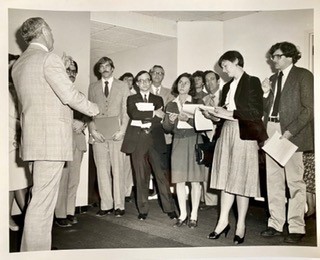According to Credit Union Magazine the top 1982 news story was the Penn Square Bank failure that involved more than 130 credit unions. (March 1983, pg 19)
The FDIC closing was over the 4th of July weekend. NCUA had planned its second on-the-road board meeting for Chicago the following week. The open board meeting was to coincide with NAFCU’s Annual convention. For Ed, Bucky and me it was also a homecoming as Illinois was where we had been responsible for regulation of state credit union activity from 1977 until going to NCUA in late 1981.
As NCUA Chair, Ed had always held a post board meeting news conference.
This time the three of us were at the table. The first question from a reporter was to me, I think from Larry Blanchard. “With all the CD exposure from investments over the $100,000 FDIC insurance, would NCUA now propose a rule limiting investments to the insured amount?”
I had prepared for lots of “what-are-you-doing now?” kinds of questions, but not his one. I instinctively said no. Bucky and Ed were quick to describe how the agency would respond with both examiner on site reviews plus the CLF’s lending capacity.
Questions and Democracy
For anyone in authority, whether public or private positions, answering unscripted questions is part of the job. It is how shareholders, the press, and interested stakeholders hold leaders accountable.
Questions are not always comfortable for the recipient. They often challenge current happenings. But the give and take is necessary. They are part of a leader’s responsibility to a constituency. They help make democracy possible.
Many leaders, not in a public setting (press conference), will ignore these voices, hoping they will go away or grow tired. Meanwhile the organization’s PR machine fills the airwaves with success stories, announcements and social media posts of positive activity. Leaders will seek a friendly setting to put out their point of view rather than engage in a public dialogue.
Just Asking
Since February of this year, Jim Blaine the former CEO of State Employees NC has published a daily website challenging the leadership and direction of country’s second largest credit union.
Six initial questions about the credit union’s direction were posed at the 2022 Annual Meeting under new business. The three motions requesting action were passed by voice vote of all members. Jim started his blog when the responses became increasingly different from the reality he was hearing from current and former employees, directors and members.
The Monday, June 26th post describes his slow conversion to action after six years of retirement growing daffodils and chickens. He describes his awakening as a matter of trust.
I know of no current CEO or credit union professional who openly supports Jim’s return to the fray. Their criticisms come down to one principle: he had his turn, now it is other’s responsibility. Or specific defenses for the changes underway.
But this is not the Navy where when the officer of the deck takes the con, he alone is in control, unless relieved by the Captain.
Democracy is not just the careful selection of new leadership until they fill out their term and move on. It is also a system of checks and balances on the exercise of power. In credit unions, these checks and balances supposedly reside primarily in the board, elected by the members at every annual meeting.
However today most boards are in practice unelected. The nomination process is controlled by incumbents. So if a Chairman, as Jim asserts, is trying to implant a new strategic direction for the credit union, how is this plan to be presented to members for their support?
Credit union boards are not places comfortable for minority points of view. I recall when the chair of the supervisory committee opposed the board’s vote to merge their $350 million firm, she resigned rather than make her position public. When the Chair of Cornerstone FCU overseeing the CEO selection committee nominated himself, no one objected. Within the year this former chair, now CEO, was seeking a merger of this iconic credit union.
Credit union boards are more and more like country club elections-directors choose their friends and acquaintances to what should be a position of accountability. Marketplace competition while present, is not limiting as it is for a stock traded financial firms where performance affects price.
So when the democratic process is lacking, the one option is revolt, the public raising of questions that challenge both individual actions and direction. For example Jim in his June 19th post asked about a $6,568,261 payment to Andrews FCU when their former CEO Jim Hayes was selected to run SECU.
The Almost 200 Credit Union Failures
NCUA’s first quarter 2023 data shows 191 fewer charters than one year earlier. These are charter failures. But not from the safety and soundness events most frequently believed to be the cause. These are failures of morale. Leaders are putting their comfort and well being ahead of responsibility to members. One need only look at the list of mergers of sound well run credit unions with capital in double digits.
SECU’s situation is an example of leadership shortcomings, not yet a financial problem. It is a situation where democratic accountability was set aside and is now being resurrected in response.
Cooperative democracy is both a process for accountability and respect for member-owners. This public challenge isn’t the first time this has occurred; it won’t be the last.

